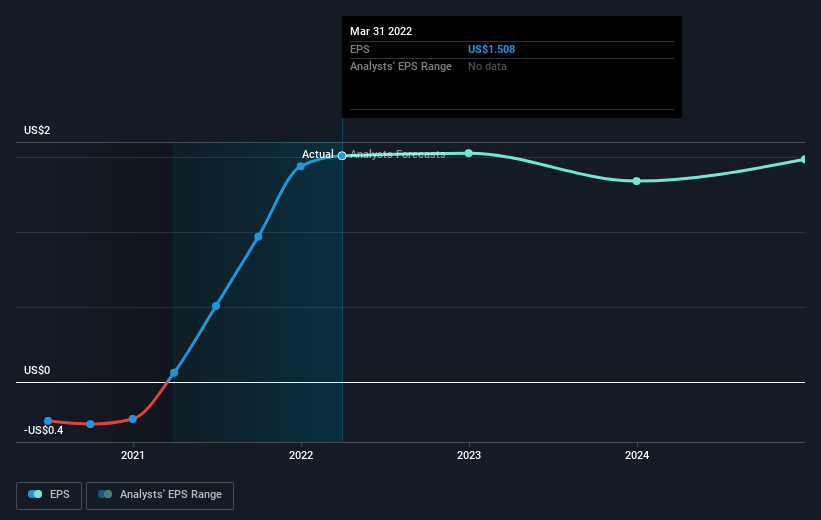- United States
- /
- Marine and Shipping
- /
- NYSE:SB
Safe Bulkers' (NYSE:SB) three-year total shareholder returns outpace the underlying earnings growth
The Safe Bulkers, Inc. (NYSE:SB) share price has had a bad week, falling 20%. In contrast, the return over three years has been impressive. In fact, the share price is up a full 193% compared to three years ago. After a run like that some may not be surprised to see prices moderate. The fundamental business performance will ultimately dictate whether the top is in, or if this is a stellar buying opportunity.
Since the long term performance has been good but there's been a recent pullback of 20%, let's check if the fundamentals match the share price.
See our latest analysis for Safe Bulkers
In his essay The Superinvestors of Graham-and-Doddsville Warren Buffett described how share prices do not always rationally reflect the value of a business. One flawed but reasonable way to assess how sentiment around a company has changed is to compare the earnings per share (EPS) with the share price.
During three years of share price growth, Safe Bulkers achieved compound earnings per share growth of 111% per year. This EPS growth is higher than the 43% average annual increase in the share price. So one could reasonably conclude that the market has cooled on the stock. We'd venture the lowish P/E ratio of 2.75 also reflects the negative sentiment around the stock.
The graphic below depicts how EPS has changed over time (unveil the exact values by clicking on the image).

It is of course excellent to see how Safe Bulkers has grown profits over the years, but the future is more important for shareholders. This free interactive report on Safe Bulkers' balance sheet strength is a great place to start, if you want to investigate the stock further.
What About Dividends?
When looking at investment returns, it is important to consider the difference between total shareholder return (TSR) and share price return. The TSR incorporates the value of any spin-offs or discounted capital raisings, along with any dividends, based on the assumption that the dividends are reinvested. So for companies that pay a generous dividend, the TSR is often a lot higher than the share price return. We note that for Safe Bulkers the TSR over the last 3 years was 199%, which is better than the share price return mentioned above. The dividends paid by the company have thusly boosted the total shareholder return.
A Different Perspective
We're pleased to report that Safe Bulkers shareholders have received a total shareholder return of 6.4% over one year. That's including the dividend. However, that falls short of the 13% TSR per annum it has made for shareholders, each year, over five years. The pessimistic view would be that be that the stock has its best days behind it, but on the other hand the price might simply be moderating while the business itself continues to execute. It's always interesting to track share price performance over the longer term. But to understand Safe Bulkers better, we need to consider many other factors. Take risks, for example - Safe Bulkers has 4 warning signs (and 1 which can't be ignored) we think you should know about.
For those who like to find winning investments this free list of growing companies with recent insider purchasing, could be just the ticket.
Please note, the market returns quoted in this article reflect the market weighted average returns of stocks that currently trade on US exchanges.
New: Manage All Your Stock Portfolios in One Place
We've created the ultimate portfolio companion for stock investors, and it's free.
• Connect an unlimited number of Portfolios and see your total in one currency
• Be alerted to new Warning Signs or Risks via email or mobile
• Track the Fair Value of your stocks
Have feedback on this article? Concerned about the content? Get in touch with us directly. Alternatively, email editorial-team (at) simplywallst.com.
This article by Simply Wall St is general in nature. We provide commentary based on historical data and analyst forecasts only using an unbiased methodology and our articles are not intended to be financial advice. It does not constitute a recommendation to buy or sell any stock, and does not take account of your objectives, or your financial situation. We aim to bring you long-term focused analysis driven by fundamental data. Note that our analysis may not factor in the latest price-sensitive company announcements or qualitative material. Simply Wall St has no position in any stocks mentioned.
About NYSE:SB
Safe Bulkers
Provides marine drybulk transportation services internationally.
Good value with reasonable growth potential.
Similar Companies
Market Insights
Community Narratives



